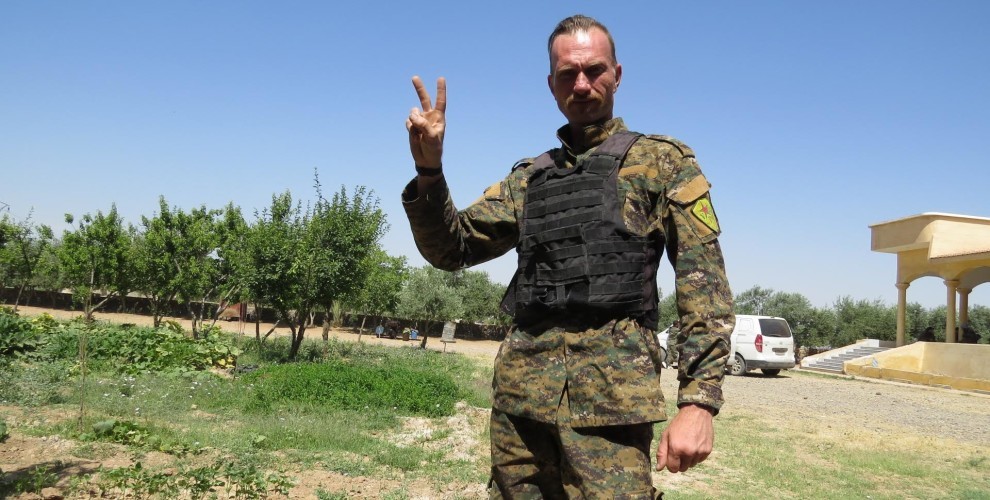Çekdar Egid, a volunteer from Torino, Italy fighting in the ranks of YPG spoke to the ANF as to why he is in Rojava and why he joined the battle for revolution against tyranny. He is now taking part in the operation to liberate Raqqa from ISIS.
Egid says he is basically an anarchist and a squatter, part of a small political movement and has been an activist in Italy for 10, 15 years.
The Italian fighter tells that he came to Kurdistan four times since 2014, during the Kobanê battle which he monitored from the border in Suruç district of Urfa, Northern Kurdistan. He then managed to go to Kobanê 3 months after it was freed.
“I joined the YPG because of the revolution. As an anarchist, I am against the state. This revolution has three significant points. First point is the political one; the democratic confederalism. The second point is radical ecologism, that I believe in absolutely. In Italy I also struggle against capitalism, which wants to destroy the environment to make money - the capitalistic normal behaviour. The third point, absolutely fundamental, is the freedom and rights of women and girls, that are not so good throughout the world, but are problematic here in the Middle East in particular.
So I think that - and it’s not just me who says this, but Abdullah Öcalan also says it in his books - first there will come the rights of women and girls, first they will be free and then humanity in general can be freed all over the world. So, basically, I’m here for the revolution, because this particular revolution is not from a nationalistic point of view. Because this revolution doesn’t want a “Kurdish state”, but a confederalism in which all different ethnic groups can live together. Kurds, Arabs, Chechens, Turkmens, Ezidis - it’s not a question of religion, everyone can have their own religion, but they don’t have to make war against each other, and all the people can live and work - possibly peacefully. But I’m not completely idealistic, and I’m not a pacifist, in a way. If a fascist and capitalist, brutal group like DAESH, led by Abubakr Al Baghdadi, want to destroy all the land and go against the Kurdish people, of course Kurdish people need to take their weapons in their hands and defend their own life. If a group of people don’t have the chance to defend themselves, they are not free. They would have to become a slave. So that’s why I’m here. I’ve been here for some 7 months. And I joined the YPG, doing all that I can do. I’m doing logistics work to support all the groups in various fronts.”
Another point that is important for me is that this revolution is fundamental for the Kurdish people, because all over the world, all peoples have the right to speak their language, to live as they want. But here in the Middle East, the Kurdish people don’t have this right. They can’t speak their language, they can’t even give their children Kurdish names. They can’t study their language, they can’t express Kurdish culture. All peoples have the right to act according to their culture and traditions, but the Kurds don’t. Kurdish people exist, but they do not exist. So they are in this situation, and Kurdistan was divided among 4 states - as everybody knows, but just as a reminder: Bakur in Turkey, Başur in Iraq, Rojava in Syria and Rojhilat in Iran. All four states oppress the Kurdish people because they would prefer it if they didn’t exist. And of course this can lead to the revolution, the resistance, or the berxwedan as it’s called here.”
Çekdar Egid who received training at the academy in Karachok (Qereçox) states that the most important thing he finds there is the “hevalti” - hevalti is comradery, being comrades, saying; “Everyone tries to help others. If I have a problem, some other heval asks me. Every time, all hevalen continue to ask, “How are you? you are good? Do you have some problem? Do you need something?” - always, always, always! And they are not just saying it, it’s real. It’s a good place, I find a lot of people here have very, very big hearts and they treat people very well. They eat together, they live together, and they make war together. If you don’t have this kind of unity, this kind of comradery, you can’t go against any enemy. Not against DAESH, not against Turkey, or whatever. Because first there is the group, and then when you have a good group, you can also have a war and battles.”














